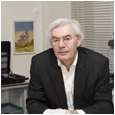SEMINAR: Nanocarrier-cell interaction: Exploring the cell surface, intracellular trafficking and nucleic acid delivery.

Seminar: Nanocarrier-cell interaction: Exploring the cell surface, intracellular trafficking and nucleic acid delivery
Date: February 27
Time: 11:00
Place: Room H117-3, 1st floor, Dpt. Of Plant and Environmental Sciences Thorvaldsensvej 40.
Abstract
Cationic lipid and –polymer based nanoparticles constitute promising chemical alternatives to viral carriers for nucleic acid delivery into cells, including genes and siRNA, for therapeutic and cell biological purposes. Identification of major (intra)cellular hurdles and underlying mechanisms of entry are critical in order to devise strategies for improved delivery. Our data reveal that nanoparticles may reach the cell surface by attachment to surface protruding filopodia, and exploit an actin retrograde flow mechanism to reach in this manner the plasma membrane for cellular internalization by endocytic pathways. In case of delivery via cationic polymers, evidence is provided of involvement of a so-called proton-sponge effect, relying on osmotic rupture of endosomal membranes. Detailed studies of delivery via lipid-based carriers reflect a more subtle mechanism, cryo-electron microscopy and small angle X-ray scattering pointing towards a role of lipid phase polymorphism in destabilizing endosomal membranes, followed by release of DNA/RNA into the cytosol and resulting in their subsequent accumulation into the nucleus.
Mini-bio
Dick Hoekstra is Professor of Cell Biology and Biochemistry, and Chairman of the Department of Cell Biology, at the University Medical Centre, University of Groningen. Throughout his career his research interests have focused on the (cell) biology and biophysics of membranes. Current major topics are the biogenesis of membrane polarity (bile canalicular membrane and myelin sheath) and the development and mechanisms of cationic lipid-based vectors in gene delivery.
Dick Hoekstra, University of Groningen, University Medical Center Groningen, Department of Cell Biology, Groningen, The Netherlands (d.hoekstra@umcg.nl)
